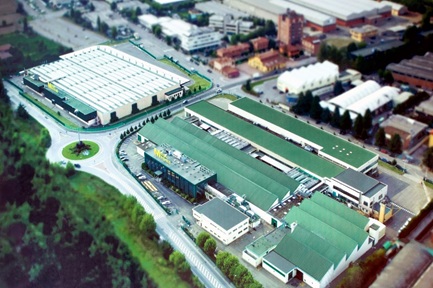MAMBO (Motor Additive
Manufacturing Boat) Commemorates a New Beacon for Boat Building with Design
Innovation Award and Varo
(Milan, Italy Oct.
8, 2020) – What better way to announce to the world a revolutionary innovation
than with a live demonstration of a real, functional 3D printed boat and varo,
a ship launch ceremony. MAMBO, the world’s first 3D printed fiberglass boat,
designed and 3D printed by Moi Composites (Moi), received its official
inauguration in traditional Italian style and flair.
The varo featured
Carla Demaria, CEO of I Saloni Nautici as the ceremony’s madrina and closed
with the boat cruising in the water to celebrate its world premiere and most
recent accolade, the Nautico 60 Design Innovation Award.
“The varo is always
a great moment,” says Carla Demaria, “the one of this boat, ...is even greater.
Two years ago, when I was UCINA - Confindustria Nautica’s president, I met
Gabriele, Michele and professor Marinella Levi from Politecnico di Milano,
which explained to us the idea of building a boat without models or molds from
3D printing. It sounded crazy and fascinating to us so we decided to help. We
always have the feeling of teaching to younger generations, sometimes we
learn.”
Professor Marinella
Levi, co-founder of Moi quoted the famous Carlo Riva during the team’s
presentation Sunday 4 October, ‘The Art of Making Impossible Vessels Possible’
and said, “the most important thing about boats is what you don't see, it's the
materials.” And it is true, critical advancements in 3D printing today include
the ability to print advanced materials, especially continuous fiber
composites. “Continuous Fiber Manufacturing (CFM) technology can 3D print real
products in impossible shapes. MAMBO’s material and design were carefully
chosen to demonstrate the power of CFM technology. “We pushed on the organic
shapes of the boat with every single curvature being impossible to manufacture
until today” saied Michele Tonizzo, Moi’s Co-Founder and CTO.
According to Dr.
Stefano Pagani Isnardi, Head of Department – Technical, Statistics, Research,
Int’l Federations for Confindustria Nautica, the Italian Marine Industry
Association, “Italian marine industry is the world's second largest, and it is
appreciated in all the world for its combination of four elements: design,
technology, artisanship, and innovation. A special thanks to the people that
believe in innovation like yourself, seeing MAMBO at the boat show was
emotional.”
Paying an ode to
past centuries of boat craftsmanship and made-in-Italy heritage, MAMBO with its
design and production methods, elevates hand-made work with modern,
digitally-made process, bringing design concepts only dreamed of before to
life. MAMBO symbolizes a beacon of the path untraveled, illuminating hope for a
new era of design and manufacturing to follow, daring boat aficionados to truly
build boats in their own way, as the same Carlo Riva mentioned earlier might
have been very pleased to hear.
MAMBO received the
60 Salone Nautico Design Innovation Award thanks to Moi’s partnership with
Autodesk, Catmarine, Confindustria Nautica, Mercury Marine, MICAD, Osculati,
and Owens Corning. Each partner brought their specific expertise and industry
skills and resources to realize the boat. Gabriele Todisco, CEO of Catmarine
joined the project for the freedom the technology provides, liberating the
composite material from molds. A value also shared by Francesco Fiorentino,
Composites Specialist of Micad, which highlighted that MAMBO’s hull is a concept explored by
very few specialists due to its particular geometry. Alberto Emilio Osculati,
Executive Director of Osculati praised the uniqueness and extreme customization
of the project and Alessandro Conti, General Director of Brunswick Marine
Italia concluded that the project was prestigious and stimulating in a field
that doesn’t shine for it’s innovation and that this project can be a radical
shift for the industry.
Moi expects to
showcase MAMBO at other events around the world and plans to open order books
for similar one-of-a-kind, custom 3D printed boats, working with interested
boat builders, designers, brokers, owners/clientele, and other key
stakeholders.
About
Moi
Moi Composites
(Moi) is a tech start-up that 3D prints custom, powerful products using robots
and advanced composite materials. Free of molds and traditional design and time
constraints, Moi’s patented process innovation can produce strong, lightweight,
unique objects in incredible new shapes, sizes, & performances, cost
effectively on demand. Founded in Milan, Italy 2018, as a spinoff of
Politecnico di Milano University, Moi’s vision is advanced composites any time,
any place, any shape. Moi won several prizes for its innovative technology,
including the prestigious Italian “National Innovation Award” and the JEC
Innovation Award, and has partners and early adopters in robotic automation and
industries such as aerospace, energy, marine, and biomedical.













